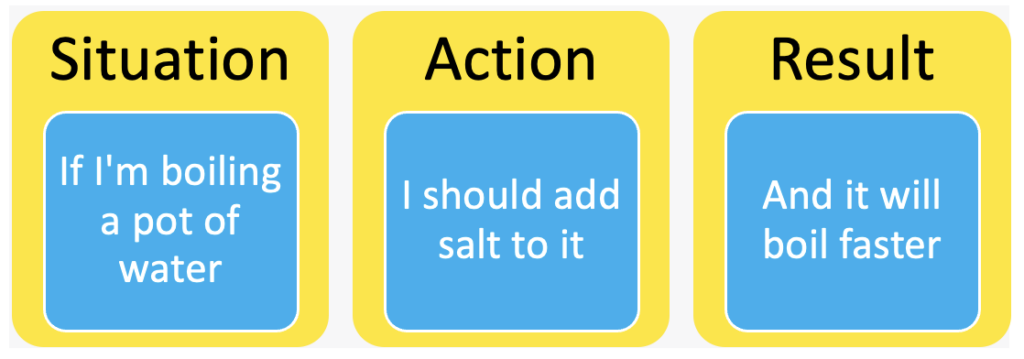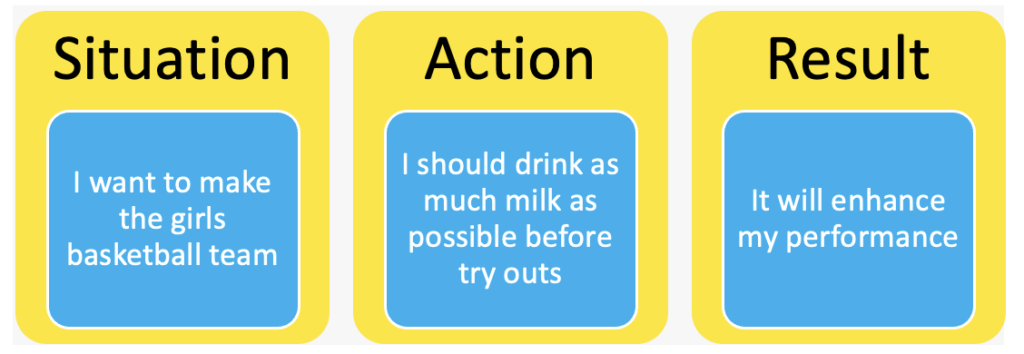Many of our daily actions are habitual, meaning they are performed automatically and without conscious thought. It's a useful way for us to save mental energy and streamline tasks that are performed frequently.
These automatic actions are often based on our learning mental models, which are the assumptions, beliefs, and frameworks that we use to make sense of the world around us. They are like little formulas about how we believe things are supposed to work.
Here's a simple example:

Except this mental model is actually incorrect. Salt doesn't make your water boil any faster (unless your pot is filled with 20% salt). If you want your water to boil faster, it would be smarter to just start with hot water.
And we have tens of thousands of these theories, big and small, secretly governing many of our actions. Here are just some of the categories they fall into:
But we haven't spent much time articulating exactly what our philosophies are in these areas. We're just mindlessly acting based on these hidden rules, instead of using a strategic mindset.
When I was in high school, one of my health learned mental models (thanks to some brilliant commercials) was that the key to being physically fit was drinking as much milk as possible. Do you remember those, "Milk, It Does a Body Good" commercials? They were very effective.

And when I didn't make the team because I was frothing at the mouth during tryouts (this is what happens when you drink nothing but milk for two days and then engage in aerobic activity!), I didn't question the mental model. I blamed the coaches for having too much running and not enough shooting drills during tryouts. I also declared that I just wasn't a runner. But I held onto that milk philosophy for a decade until I started proactively learning about health and fitness.
We protect these assumptions by never questioning them. Where did they come from? Are they working for us? Do they need updating?
And yet learning mental models determine how strategic we are in our actions. If our philosophies are accurate and helpful, they can guide us toward big wins. On the other hand, if our mental models are flawed or limited, they can lead us down the wrong path and prevent us from achieving our goals.
Or, in the words of Charlie Munger, "You get further in life by avoiding repeated stupidity than you do by striving for maximum intelligence."
Method 1: Updating our questions
1. When you ask a question that you ask often, reflect on whether you’re getting the kind of response that you’re hoping for.
Ex: You ask your kid after school how their day was. They say "Fine." You try again. You ask them, "What was the best part?" or "What did they learn?" They don't remember. It feels like a very unsuccessful interrogation. These questions and learning mental models that make you think they should be working aren't serving you.
2. Try some other questions instead to see if you get a better response. Ask others about what questions they use to accomplish the same goals.
One question that has worked well for me is: "How was your day on a scale of 1 to 10?"
Method 2. Mental Model reflection
1. Identify an area of your life that you would like to grow or improve. (It's not too late for New Year's resolutions!)
2. Make a list of all the mental models you currently have about that subject and see which ones might need to be updated or might not be serving you.
3. Seek out new perspectives on these philosophies. Consider asking for feedback from others.
4. Update one mental model at a time and come up with a way to test the new approach.
Method 3. Inspiration
1. Find a source of inspiration that regularly challenges your existing learned mental models. My monthly newsletter attempts to do just that. Ask This Not That is a monthly dose of question makeover – in which I take one common question and offering an alternative that could help you get much better results.
2. Join a group of people who like to talk about this topic. There are strategic mindset groups on both LinkedIn and Facebook.
Whatever method you choose, understand that the quality of your strategic thinking is determined by the life philosophies swimming around in your head. Identifying and upgrading these mental models can help you make better decisions, solve problems faster, and identify big opportunities.